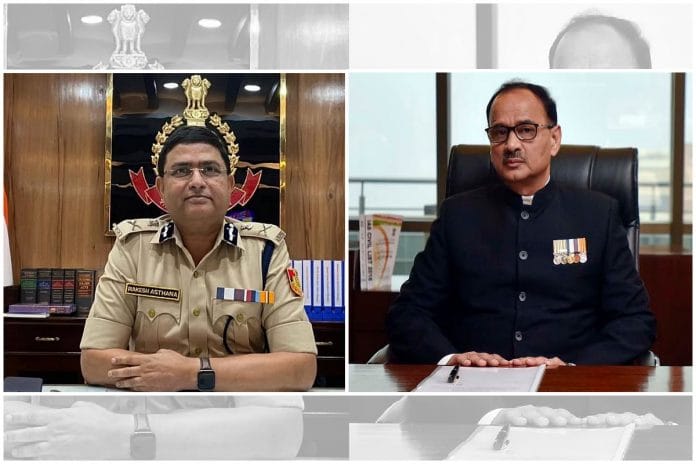New Delhi: When the turf war between CBI chief Alok Verma and his deputy Rakesh Asthana peaked in October 2018, the phone of India’s now external intelligence chief Samant Kumar Goel was put on tap for at least seven days by the anti-corruption agency without following due procedure, court orders made public earlier this month have revealed.
Goel was then number two in the Research and Analysis Wing (RAW), and widely tipped to be front-runner for heading the external intelligence agency when incumbent Anil Dhasmana’s tenure ended.
The fact came to light as a special CBI court in Delhi heard a bribery case stemming from an FIR filed against Asthana on 15 October 2018 by the investigative agency under Verma. Asthana was then a special director in the CBI, and the FIR initially also mentioned a deputy superintendent of police, Devender Kumar.
The FIR was filed on a complaint by Sana Satish Babu, a Hyderabad-based businessman who had been called for questioning by the agency in its case against meat exporter Moin Qureshi.
The CBI under Verma alleged that Sana Satish paid a bribe to Asthana through three alleged mediators named Manoj Prasad, Somesh Prasad and Sunil Mittal. The agency later said it didn’t find any evidence against Asthana or Kumar, but chose to formally charge the Prasads and Mittal.
The court, however, has now discharged the three in the case, which in effect means they will not face trial.
The verdict came as the court found the CBI — under Verma — to have intercepted phones without following the due procedure listed under the Indian Telegraph Act.
According to the court orders, the CBI put 18 mobile numbers — including Goel’s — on surveillance between 10 October and 20 October 2018 in connection with its probe against Rakesh Asthana.
The surveillance order was issued by Alok Verma as director of the CBI. The order was valid for 7 days but — under the Telegraph Rules, framed under the Indian Telegraph Act — it had to be ratified by the Union home secretary to stay valid.
During court proceedings, the CBI could only produce the home secretary’s authorisation for tapping six mobile numbers, and Goel’s number wasn’t among them. A further step — to get the decision examined by a review committee — was not taken either, the court found.
In all, the CBI intercepted a total of 11,381 calls and 6,111 SMSes from the 18 numbers. At the time of filing formal charges, the agency said only 18 calls were found to be incriminating.
However, as the CBI could not produce relevant authorisation documents for the interception, the court threw even this evidence out.
Also read: The RAW link in CBI tussle between Alok Verma and Rakesh Asthana
What the Telegraph Rules say
Rules framed under the Indian Telegraph Act allow the head of a police organisation to approve the interception of mobile communication in emergency situations for seven days.
Once the tap order is issued, it needs to be submitted to the Union home secretary (if it’s a central police organisation, and to the principal secretary home in case of a state law enforcement agency) for ratification within three working days, following which the home secretary has to confirm the initial order within seven days of its issuance.
If the confirmation from the competent authority is not received within seven days, the rules add, such interception shall cease.
The rules also state that if the confirmation from the home secretary is received, his order goes to a review committee within the subsequent seven working days. The review committee meets at least once in two months and records its findings on whether the interception directions issued were in accordance with the law.
If the review committee is of the opinion that the directions are not in accordance with the law, it can set aside the directions and order the destruction of the copies of the intercepted messages.
What the court said
In the court orders, dated 13 March, principal district & sessions judge Vinay Kumar Gupta noted that the CBI had placed on “record 6 orders D-18 to D-23 all dated 16.10.2018 of the Union home secretary in respect of interception of six mobile phone numbers…”
With respect to the “remaining 12 orders D-24 to D-35 issued by the director CBI, nothing has been placed on record nor any affidavit has been filed in terms of the decision in Santosh Kumar v CBI and Ors. (supra) as to compliance of the Telegraph Rules to show that these orders were ever sent to the competent authority for confirmation as required”, he added.
Judge Gupta said that — even in the six decisions authorised by the home secretary — the CBI had not shown any material on record to prove that these were further submitted to a review committee.
In that light, the court said, “no reliance can be placed on the audio conversations contained in these 18 mobile phones and the transcriptions…”
The war within the CBI finally led to the ouster of both Verma and Asthana from the the agency.
(Edited by Sunanda Ranjan)
Also Read: Delhi excise policy case: CBI defers questioning Sisodia, fresh date to be issued






